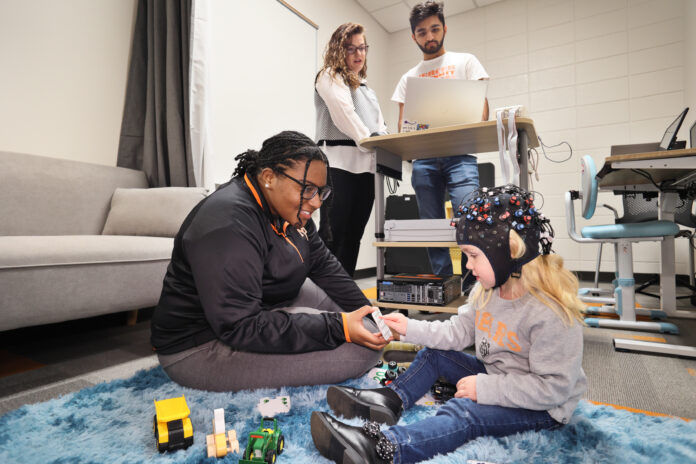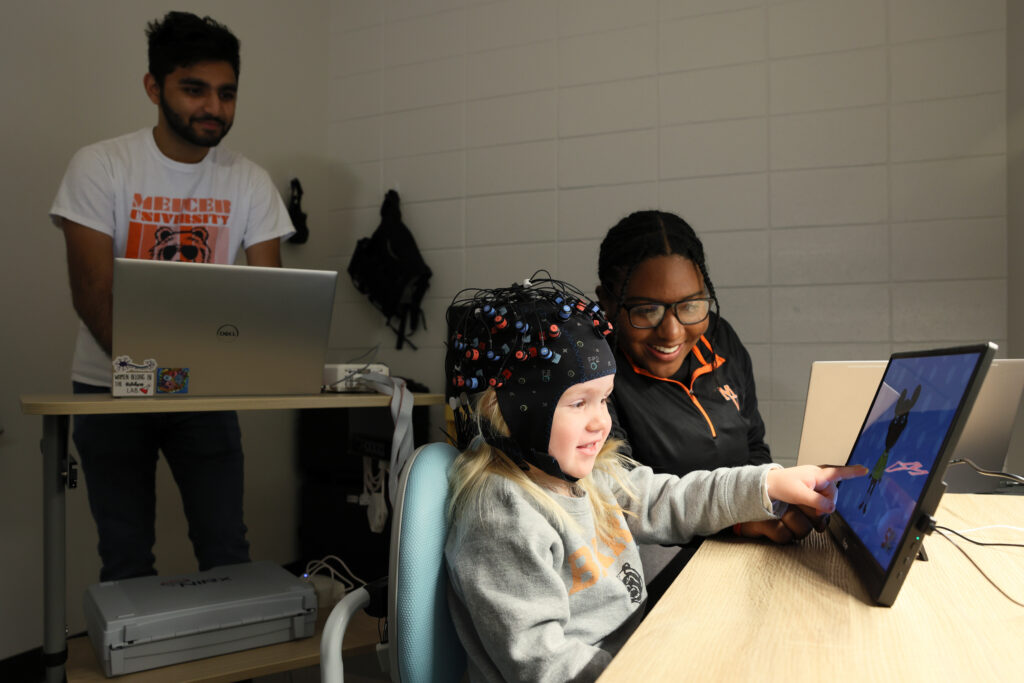
A Mercer University psychology professor hopes to make neuroscience research more inclusive and diverse through the use of cutting-edge technology in her lab.
Dr. Anastasia Kerr-German, an assistant professor of biological psychology and neuroscience, joined the faculty at Mercer this fall and brought with her a new neuroimaging tool called functional near-infrared spectroscopy, or fNIRS, that her students are starting to use.
“Mercer has this unique position where they value quality research, but they also really value excellence in teaching,” she said. “I wanted to go to a place where I could do highly impactful research for bettering the world.
“Mercer is very much into service learning and being a part of the communities we are embedded in. So I could marry research in a meaningful way to my passion for mentoring and teaching students.”
Dr. Kerr-German, who is originally from Gwinnett County, has a background in experimental psychology and developmental cognitive neuroscience. Her work as a postdoctoral fellow and then a scientist faculty member at Boys Town National Research Hospital, where she managed her own lab, focused on young children with clinical and mental health disorders, including learning disabilities, developmental disorders, and disorders associated with abuse and trauma.
“We are so excited to welcome Dr. Kerr-German into the Psychology Department at Mercer,” said Dr. Amy R. Borchardt, co-chair of the department. “Psychology and neuroscience students will have the unique opportunity to get hands-on experience working with her using cutting-edge technology to conduct research.”
fNIRS is a neuroimaging method that measures oxygen levels in the blood using near infrared light, Dr. Kerr-German said. A cap outfitted with technology is worn on a person’s head and connects to additional technology in a backpack.
“Mercer will be one of the only universities, public or private, in the state of Georgia that will have fNIRS,” she said.
The technology is noninvasive, portable and tolerant of motion, while also being highly sensitive in its measurements. fNIRS uses the same kind of technology as the fingertip pulse oximeters that many doctors use, but it measures the blood flow in the cortex of the brain.
“When your brain is activated or being recruited to do some task, it requires you to replenish oxygen to that area via your vascular system,” Dr. Kerr-German said. “This response is called the hemodynamic response, and it occurs two to three seconds after that part of the brain does some kind of work. So what we’re able to do is use markers in that data to look two to three seconds after an activity to see which part of the brain was doing work and how much work.”

Dr. Kerr-German has 12 students currently involved in her fNIRS research, but many more have expressed interest. This semester, they have been testing the technology and setting up a child-friendly lab space. Dr. Kerr-German has received Institutional Review Board approval for research that will start in the spring that aims to bridge a population gap in fNIRS research.
So far, research using this technology has largely excluded individuals with thick or protective hairstyles that don’t allow easy access to the scalp because of the challenges to getting a proper fit with the cap.
“That’s unacceptable because it’s exclusive, and we then don’t get representation of everyone in our data set. We as neuroscientists can do better,” Dr. Kerr-German said.
Mercer students who identify as Black or African American and use protective hairstyles will be recruited for the study. Dr. Kerr-German and her student team will measure the cortical activation of these volunteers and find a way to provide a more comfortable and effective fit for the fNIRS caps.
“It’s one step further using this technology to increase generalizability of neuroscience data for humans, and also I feel like really doing what we as Mercerians are called to do, which is to make sure everybody has a voice. We’re really excited about that first project,” she said.
Through her research at Mercer, Dr. Kerr-German hopes to address “data deserts” like this that exist in the field of neuroscience. Her prior research focused on another understudied group: toddlers. She coined the term “toddler data desert” to describe the lack of appropriate research methods and, therefore, neuroscience data on young children.
“It seems that the field is hesitant to address the hard-to-reach populations with this new technology that is specifically built to address them,” she said. “There’s not a lot of diversity and demographics for neurodiversity research.”
Dr. Kerr-German’s ultimate goal is to use her research and the fNIRS technology to reach local children at risk for developmental delays and learning disabilities. She wants to partner with other Mercer schools and colleges as well as community agencies to build a network of health resources and services for families in need.
“I want to focus on relationship-first research, where we build these community relationships where we are giving to the communities as much as they are helping us push the needle in science,” she said. “There’s a huge need here for mental health support as well as access for traditionally underserved and understudied populations.”
Mercer students or community agencies interested in working with Dr. Kerr-German on her research can contact her at kerr-german_an@mercer.edu.








